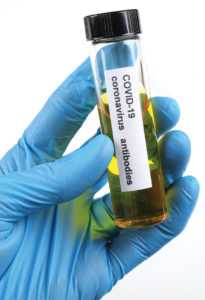

Types of Antibodies
COVID-19 antibodies are y-shaped proteins found in the blood that help to fight infection through immune function. If a person becomes infected with COVID-19, which is the antigen, IgM antibodies are present from the onset and try to fight the viral infection. After the body is finished fighting the virus off, IgG antibodies form. These provide ongoing protection from the same viral properties, and the body uses those IgG antibodies to ‘remember’ how to fight it off if re-exposed to the virus.
Researchers have developed a precise antibody test for COVID-19. The blood test looks for specific antibodies that are fighting or fought the coronavirus, as opposed to the common cold or seasonal flu.
Antibody Testing
We’re all accustomed to recognizing the COVID-19 cell, as it’s reshown on news channels, magazine covers, newspapers, and online news networks across the globe. The name Corona means crown. The cell has spikes (like spikes of a crown) that are actually what causes the virus to invade of healthy cell’s receptors. The spike proteins are what attaches to a person’s cells, invades through the receptors and alerts the body to create the y-shaped antibodies, so they can attach to the antigen and kill it. The blood test is simple and quick for the patient. The reagents used are able to detect and decipher the different types of antibodies in the blood.
The COVID-19 antibody tests are under the FDA’s Emergency Use Authorization, meaning there might be discrepancies in the accuracy of the tests due to its limited study. However, these tests are important for two reasons; the first is to determine how infected areas are, were or could be, and the second is convalescent blood plasma can be made. If individuals show antibodies to the virus, their blood plasma can be made into a viable treatment for those suffering from the virus.
Reopening the Country
It’s ideal if the majority of people are able to receive the antibody tests. This information will allow researchers to know how many people in a certain area had it and have the antibodies specific to COVID-19. If a significant amount of people have antibodies, then ‘herd immunity’ is thought to be a beneficial factor. This means that the majority of people had it, and therefore the risk of infection to others is low.
If only minimal numbers of a community have antibodies, then the risk of infection is still high. These factors are critical in determining whether it’s safe to reopen areas of the country and what precautions to take going forward.
Reentering Society Safely
In the meantime, we all want to get back to our normal lives, but it’s wise to be prepared to reenter the world with great precaution. We will need to wear masks or face coverings, continue to practice good hygiene, and maintain a safe distance between each other for a while.
Integrative Pain Management of Naples: Taking Extra Precaution for Patient’s Safety
Dr. Ranasinghe has implemented telemedicine as well as a strict in-office protocol to keep her patients safe via social distancing:
• Each patient waits in their car until the previous patient has exited the building
• A staff member tells patients when they can enter the office
• The office staff is meticulously disinfecting all surfaces and rooms between patient care
• There is no patient to patient interaction
• Telemedicine visits are recommended to patients, whereby patients can visit with Dr. Ranasinghe via a video chat without having to leave their homes
Chaturani Ranasinghe, M.D.
Dr. Chaturani Ranasinghe is a double board-certified Anesthesiologist and Interventional Pain Medicine physician. Dr. Ranasinghe is educated and experienced in all aspects of pain management, including the entire range of pain management procedures, including Radiofrequency ablation procedures and Spinal Cord Stimulation. However, she began to notice a trend in her patient’s own request for more holistic options for pain relief. She took it upon herself to learn and utilize acupuncture in her treatments and incorporated other alternative healing methods into her management of pain. Her decision to open a facility in Naples is founded on enabling the patient to be highly involved in a truly integrated approach.
With her knowledge and the use of advanced medicine, she has been able to help many patients who had little hope of a functional life. Dr. Ranasinghe consistently works to bring patients the education they need as she believes that well-educated patients have the best chance for pain-free lifestyles.
To schedule your appointment, please call 239-234-2448, or to learn more, please visit their website at ipmnaples.com.
239.234.2448
www.ipmnaples.com
Integrative Pain Management of Naples
1855 Veterans Park Drive, Suite 304
Naples FL 34109
 Southwest Florida's Health and Wellness Magazine Health and Wellness Articles
Southwest Florida's Health and Wellness Magazine Health and Wellness Articles
